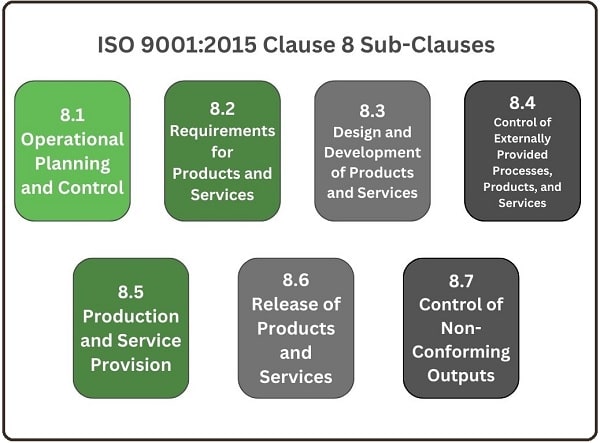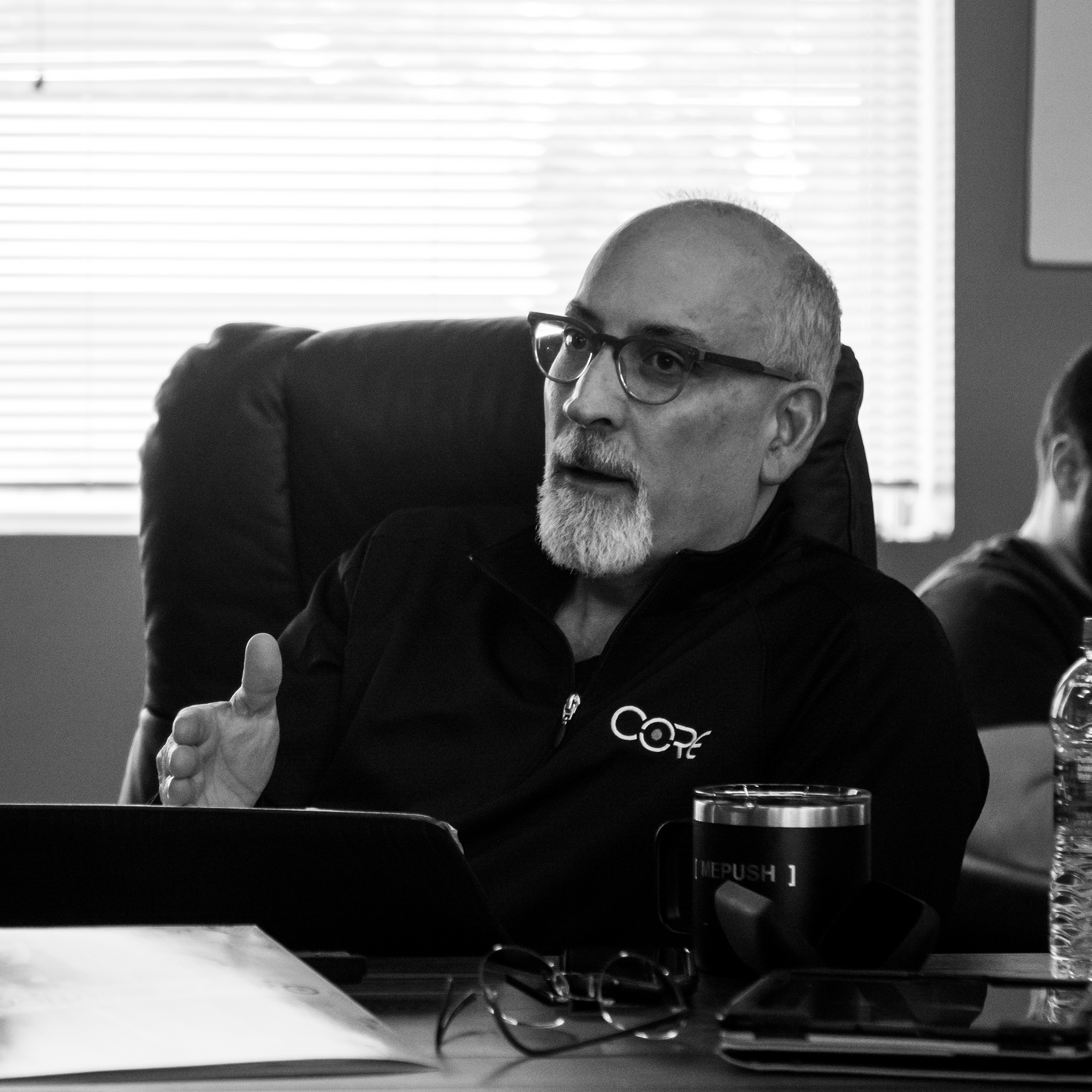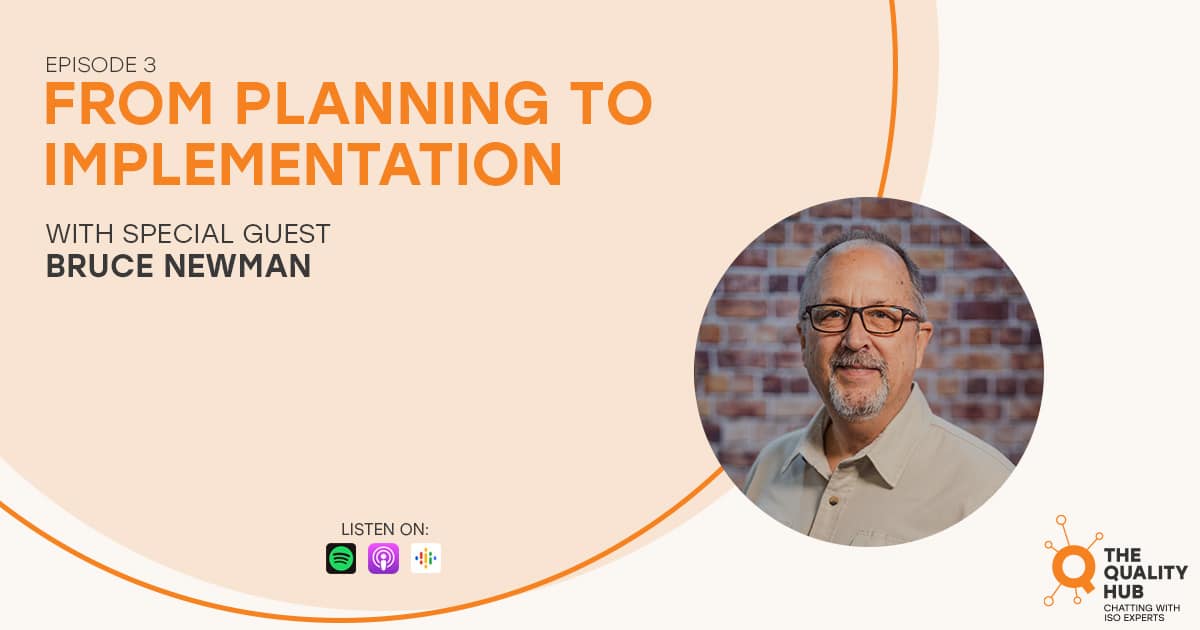ISO 9001:2015 Clause 8.1
What is ISO 9001:2015 Clause 8.1?
Clause 8.1 of ISO 9001:2015 focuses on operational planning and control needed to meet the requirements for the provision of products and services within the context of the organization’s quality management system. This clause addresses the need for systematic planning and control of products and services to ensure they align with the organization’s quality objectives and contribute to meeting customer requirements.
Key points outlined in Clause 8.1 include:
Operational Planning:
Organizations are required to plan their operations to achieve the desired quality objectives. This involves establishing the criteria needed for the process and the acceptance of products and services.
Risk-Based Thinking:
The clause emphasizes the importance of considering risks and opportunities when planning and operating processes. Organizations are encouraged to identify and address risks that could affect the ability to deliver products/services that meet requirements and enhance customer satisfaction.
Get a Free Quote
Criteria for Operation:
Establishing criteria for the operation of processes includes defining key parameters, conditions, or benchmarks that need to be met to ensure the effective functioning of operations and the achievement of desired outcomes.
Process Control:
Organizations must establish controls for their operational processes. This involves implementing measures to ensure processes operate within specified criteria, addressing variations or deviations promptly.
Change Management:
The clause addresses the need for controlling changes within operations. Organizations should have processes in place to manage and assess changes that could affect product/service quality or the effectiveness of the quality management system.
Monitoring and Measurement:
Establishing methods for monitoring and measuring operational processes to ensure they meet the intended objectives and conform to planned criteria. This includes implementing performance indicators and metrics.
Analysis and Improvement:
Analyzing performance data collected from operations to identify opportunities for improvement. Organizations should continually seek ways to enhance the effectiveness and efficiency of their operational processes.
Overall, Clause 8.1 underscores the importance of systematic planning, control, and monitoring of operational processes within the quality management system. It aims to ensure that operations are aligned with organizational objectives, customer requirements, and quality standards, while also fostering a proactive approach to risk management and continuous improvement.
How do you comply with Clause 8.1?
Compliance with Clause 8.1 of ISO 9001:2015, which addresses operational planning and control within a quality management system, involves several steps to ensure effective planning, execution, monitoring, and improvement of operational processes:
Establish Operational Objectives:
Define clear and measurable operational objectives aligned with the organization’s quality policy and overall objectives. These objectives should be specific, achievable, relevant, and time-bound.
Risk Identification and Assessment:
Conduct risk assessments to identify potential risks and opportunities related to operational processes. This includes evaluating factors that could impact product/service quality, customer satisfaction, or the effectiveness of the quality management system.
Operational Planning:
Develop plans outlining how operational processes will be executed to achieve objectives and manage identified risks. These plans should include resource allocation, timelines, responsibilities, and performance indicators.
Criteria for Operation:
Establish criteria for the effective operation of processes for products and services. Define key performance indicators (KPIs), quality standards, process parameters, and other relevant benchmarks that processes must meet for successful operation.
Implement Controls:
Implement controls and procedures to ensure operational processes for products and services adhere to defined criteria. This involves establishing documented procedures, work instructions, or protocols to guide employees in executing tasks effectively.
Change Management:
Develop a robust change management system to assess, approve, and implement changes within operational processes. This includes evaluating potential impacts on quality, effectiveness, and compliance before implementing changes.
Monitoring and Measurement:
Regularly monitor and measure performance against established criteria and objectives. Collect relevant data using metrics, audits, inspections, or other monitoring methods to assess process performance.
Data Analysis and Improvement:
Analyze collected data to identify trends, areas for improvement, and opportunities to enhance operational efficiency and effectiveness. Implement corrective and preventive actions to address identified gaps or opportunities.
Training and Awareness:
Provide necessary training and ensure awareness among employees involved in operational processes. Employees should understand their roles, responsibilities, and the importance of adhering to established procedures.
Documented Information:
Maintain documented information related to operational planning, controls, procedures, and changes. Ensure accessibility and update documentation as needed.
Continuous Improvement:
Foster a culture of continuous improvement by encouraging feedback, implementing lessons learned, and regularly reviewing and updating operational plans and processes.
By implementing these steps and integrating them into the organization’s operations, you can effectively comply with Clause 8.1 of ISO 9001:2015, ensuring that operational processes are well-planned, controlled, monitored, and improved to support the achievement of quality objectives and customer satisfaction.

What is the History of Clause 8.1?
The history of Clause 8.1 in ISO 9001:2015, which focuses on operational planning and control within a quality management system, aligns with the evolution of ISO 9001 and its approach to managing operational processes.
Prior Versions
Before the release of ISO 9001:2015, earlier versions of the standard (such as ISO 9001:2008) also had clauses addressing planning and control of operations but with different numbering and structure.
Improving Operational Processes
The evolution of Clause 8.1 reflects a continuous emphasis on enhancing the systematic planning, execution, monitoring, and improvement of operational processes within the quality management framework.
The significant changes between ISO 9001:2008 and ISO 9001:2015 involved a shift in perspective. The 2015 revision aimed to align the standard with a more comprehensive approach to risk-based thinking and strategic planning. The focus on risk identification, planning, and control within operational processes became more pronounced in the 2015 version compared to previous editions.
ISO 9001:2015
Clause 8.1 in ISO 9001:2015 was developed to emphasize the importance of considering risks and opportunities when planning and operating processes for products and services. This shift was part of a broader effort to encourage organizations to adopt a proactive approach to risk management, aligning operational planning with broader organizational goals and customer requirements.
The history of Clause 8.1 signifies a deliberate evolution in the ISO 9001 standard’s approach, aiming to encourage organizations to be more strategic, proactive, and systematic in planning, executing, controlling, and improving their operational processes for products and services. It emphasizes the importance of considering risks and opportunities while setting clear criteria for operation and maintaining effective controls to achieve quality objectives and customer satisfaction.
Helpful Resources: From Planning to Implementation Podcast
In this week’s podcast, Bruce Newman, Lead Consultant at Core Business Solutions, will be discussing the essential aspects of ISO 9001 implementation and the importance of maintaining control over documentation. Bruce will guide listeners through measurement planning, and highlight the necessary role that management plays in the success of a QMS implementation, and the importance of the QMS to employees. Learn More
Consulting Support for ISO 9001
Every year, we help hundreds of small businesses achieve ISO 9001 certification. Support for ISO 9001 is available through any of our Consulting Programs As an American business with a story like yours, we know that time is valuable. Our expert consultants are here to take on the difficult, technical aspects of certification so you can focus on your business. They’ll work with you every step of the way until you’re successfully certified. Interested? Get a Free Quote.
In many industries, ISO 9001 has become a supply-chain requirement. When landing a big contract, ISO 9001 certification could make all the difference.

About Core Business Solutions
"Core Business Solutions was started by my brother, Mike Dawson, and myself, true entrepreneurs at heart looking for a better way to make a living and help small businesses improve the quality of the products and services they provide.
The bottom line: we are real people that have developed a team to come along side you to help you grow and succeed."
-- Scott Dawson, President
Related Standards
We provide consulting support for various other standards, as well as support for companies seeking multiple certifications through an Integrated Management System.
AS9100
Aerospace Manufacturers
AS9120
Aerospace Distributors
ISO 14001
Environmental Management Systems
ISO 27001
Information Security Management Systems
ISO 20000-1
Service Management Systems
ISO 45001
OH&S Management Systems
ISO 13485
Medical Device Manufacturers
AS9100
AS9120
ISO 14001
ISO
20000-1
ISO 27001
ISO 45001
ISO 13485
Equip Your Business to Meet ISO 9001 With CORE
At Core Business Solutions, we’re here to equip your company for success in meeting ISO 9001 requirements. We’ve helped hundreds of small businesses grow and deliver the best solutions to their clients. We provide ISO training services, consulting help, and compliance software and to help you get certified and stay certified. We focus on optimizing your processes and helping you implement an ISO-compliant QMS. When you partner with us, you’ll get the tools and help you need for success. For more information on the ISO 9001:2015 standard, please visit our articles page. You can also call our consulting office at 866-354-0300.
Do you want to update your existing ISO 9001 QMS System or refresh it?
We provide consulting services to assist you in your ISO 9001 Quality Management System refresh. We listen, conduct a gap analysis, update your Quality Policy and any necessary documentation or procedures, find areas of waste or improvement, simplify and automate. And we do it fast. Core offers firm, fixed pricing. Download our information sheet today to learn more or call us at 866-354-0300 Extension 2.

